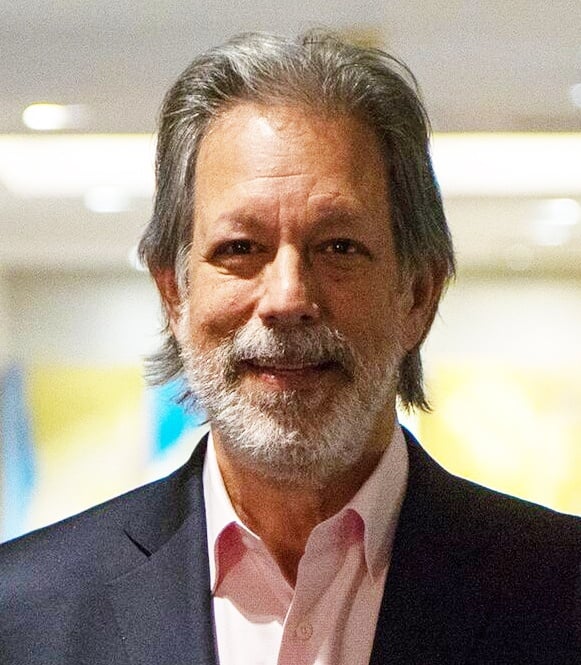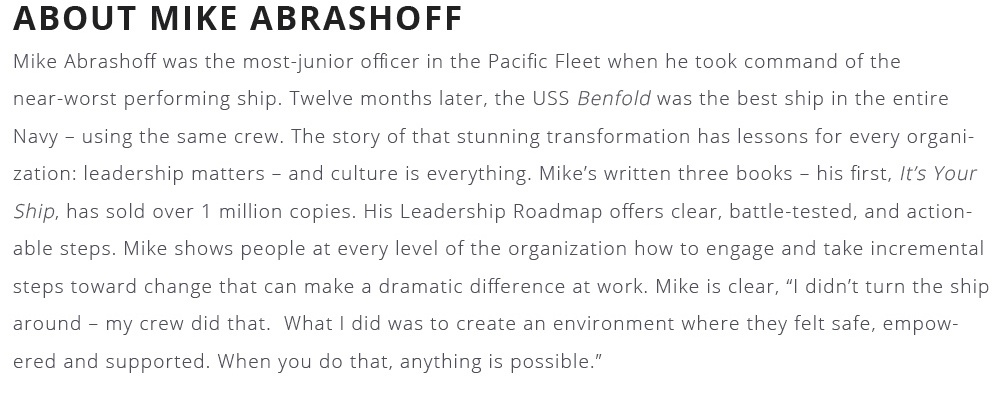DON'T LET GOALS BECOME LIMITS: ACHIEVING BREAKTHROUGH PERFORMANCE
MIKE ABRASHOFF'S "NO-LIMITS MANAGEMENT" CREATES A CULTURE OF INNOVATION
What organization isn’t searching for a path to inspire breakthrough performance by engaging the employees differently? If you’re among them, this story will inspire some fresh thinking on the subject.
Former Navy Captain MIKE ABRASHOFF, author of the million-copy bestseller It’s Your Ship, is at the center of one of the most remarkable modern day stories of organizational transformation. At the age of 36, the Navy selected Mike to become commander of USS Benfold. At the time he was the most-junior commanding officer in the Pacific Fleet – on a ship that was plagued by low morale, high turnover, and abysmal performance evaluations. Few thought that the ship could improve - yet 12 months later the ship was ranked #1 in performance – using the very same crew. People were amazed and the lesson was clear – leadership matters and culture is everything.
In many ways, the USS Benfold was an extreme example of the same problems facing many organizations today. That’s why dozens of publications including The Wall Street Journal and Fast Company have cited Mike’s story as an inspiring lesson for business. Many leaders identify with Mike’s situation: being accountable for the results in an environment where he couldn’t make the rules, only live with them.
As Mike worked to turn his ship’s fortunes around, there was a “Eureka!” moment. Instead of working hard to bring the ship in line with average performance standards, suppose he focused instead on getting his crew to rethink every aspect of their jobs? What would happen if everyone stopping striving to be “average” and instead did their job as well as possible? Suppose he created a culture of innovation? That decision was transformational and I wanted to explore that with Mike in this article.
What follows is a conversation with Mike Abrashoff on what he calls No-Limits Management – a new way of unleashing the power of people to accomplish your most audacious goals.
Hope you enjoy it and, as always, all comments welcome.
Q&A WITH MIKE ABRASHOFF
How did you come up with the term, No-Limits Management?
Like any big organization, the Navy has average performance ratings for its ships. When I took command of the Benfold, which had historically underperformed in all measured categories, I woke up every day thinking about how we were going to get up to “average.” That’s not a lot of fun for anyone – me or the crew. I came to the conclusion that the only thing standing in the way of breakthrough performance was our own view of what was possible. That’s when I became committed to building our culture around a different message: there are no limits to what we can accomplish if we work together and come to work to succeed. It was a turning point and put the ship on course to become the best ship in the U.S. Navy.
How did you see your role?
I'm not an HR expert. I was a mid-level manager in a 400,000 person organization. My goal wasn’t to change the rest of the Navy. My goal was to make my own little piece of it the absolute best that I could because what I never wanted to have to do was to write the parents of any of my sailors to tell them that their sons or daughters aren’t coming home because we didn’t give it our best.
What was your plan to turn things around?
I can’t order excellence from sitting in the captain’s chair. I had to create a sense of urgency that got across to the crew: we’re not playing to come in #2. We’re playing to win! And it’s about putting ourselves in a position to control our own destiny. The only way we’re going to get there is if all 310 of us step up to the plate, start working together better as a team, start challenging every aspect of our operation. Those actions would create the breakthrough performance we were after.
Top Leadership Speaker MIKE ABRASHOFF: No-Limits Talent Retention
How did you communicate this new message?
I got the whole crew together after I took command, all 310 of them. And when you think of the military, you think top down command and control. You know, people execute orders and they do only what they are told to do. I wanted to flip it upside down. I got the whole crew together and I said, “I don’t care what your age is. I don’t care what your rank is. I don’t care how long you’ve been in this organization. It’s okay to come to work every day and challenge every aspect of our operation. If you have an idea as to how we can improve our process on this ship or how we can execute better on something, I don’t want you to fear raising your hand and telling your chain in command about it. I’m going to honor the people that are constantly challenging everything cause that’s the only way we’re going to get better. And from this day forward when I ask you why we do something a certain way, you are never authorized to tell me, "that’s the way we’ve always done it."
Stop putting limits on what you believe is possible in your organization with top leadership speaker MIKE ABRASHOFF
How did they respond?
They were apprehensive at first; understandably. This was a huge change from the previous captain so it was about changing people’s mindsets and getting them to take greater ownership and accountability. It was also important for everyone to remember that It’s a journey. Every day we’re going to improve just a little bit. I don’t get to radically change our business model in a Navy that’s been around for over 200 years. But the one thing I can change is people’s mindsets. I can get them to understand that our success and safety come down to how well we constantly improve and change everything for the better on the ship. In the end, the transformation on the Benfold was the crew’s accomplishment – what I did was change the culture and my own leadership mindset. Sailors were excited about coming to work because their input and ideas were welcome. That unleashed all the potential that had been lying in wait in the organization, creating a strong culture of innovation.
You said your Pentagon experience set you up to succeed in your captain’s role. How?
I was not in a leadership position. I was the junior military assistant. The senior military assistant was the same job Colin Powell had when he was a two-star. That was a pretty important job but my job was to push paper. Every day a four-foot stack of paper would come through Sec-Def’s office. I got to work at 5:30 every morning and I’d sit there with a highlighter and highlight what I thought was important from this four-foot stack of papers. My goal was to get it down to eight or nine inches of stuff and put it in the general’s “in” basket and then he would decide whether it was truly important enough for the secretary of defense to see.
The general never had time to train me. It was a stress-filled office and he just threw me into the job and said, “Here, do it.” And from my desk, I could watch the general work every day. At the beginning, I noticed he was throwing 90% of what I thought was important in the trash can without ever giving me any feedback. I became de-motivated. I hated this job. I actually thought about resigning from the military because I was so unhappy. Finally, one day I decided, if the general doesn’t have time to coach or train me, I’m going to train myself.
How did you do that?
What the general never knew was when he went home from work at 8:30 at night, I would go into his office and take his trash can, dump it out on his desk and I would compare everything of mine that he threw away to what he sent on to the secretary of defense. And what I tried to do was to figure out what was important to my boss and try to read his mind. The goal was to be more effective for him and lift burdens off his shoulders. Pretty soon, 90% of what I was sending in, the general was just rubber stamping it and sending it on to the Secretary. And by me becoming more effective, the general never realized I was lifting burdens off his shoulders so that he had more time in his day to do what he thought was important.
Near the end of his tour, his son came down with a very rare illness and almost died. And the general was off work for 45 days. And normally when the senior military assistant is off work, they bring in a visiting two or three-star admiral or general to fill his shoes. Defense Secretary William Perry said, “let Mike do it.” For 45 days, I did the same job that Colin Powell did when he was a two-star. Now, I didn’t do it at the same level, but in 45 days I never let one ball drop.
After the general’s son recovered, he came back to work and went in to see the secretary for a private conversation. What they never knew was when they were having a private conversation, I would always stand in the doorway listening. I called it intelligence gathering. The general goes in and says, “Dr. Perry, how did Mike do in my absence?” Without thinking, William Perry looked up and said, “Paul, Mike did great. I consider you and him interchangeable now.” The general’s shoulders dropped; a two-star West Point graduate was just compared to a low-life Navy commander. My chest went out and it was like, yes, I can do two-star level work!
SUPPLEMENTAL READING - Employee Engagement Ideas From
Top Leadership Speaker Mike Abrashoff
and How Mike Abrashoff Made The USS Benfold The Best Damn Ship In The Navy
How Did That Change You?
What William Perry unwittingly gave me that day was validation. And from the validation, it gave me the confidence to go become a better captain. On my last day in his office, he called me in to give me the best piece of leadership advice. He told me that if I’m disappointed in an outcome, not to blame others first, but to look inward and ask myself what I could’ve done differently to have generated a better outcome. William Perry is the one who taught me to always challenge the process. It’s something I continue to do to this day and it was crucial to the breakthrough performance we achieved on the USS Benfold.
About Tony D'Amelio
Tony has spent his career putting talented people and audiences together, first in the music business and later representing the world's leading speakers. After concluding 27 years as Executive Vice President of the Washington Speakers Bureau, Tony launched D'Amelio Network, a boutique firm that manages the speaking activities of a select group of experts on business, management, politics and current events. Clients include: Mike Abrashoff, Mariana Atencio, Chris Barton, Lisa Bodell, Geoff Colvin, Daryl Davis, Suneel Gupta, Ron Insana, Katty Kay, Polly LaBarre, Nicole Malachowski, Ken Schmidt, and Bob Woodward.

.png)

.jpg)



